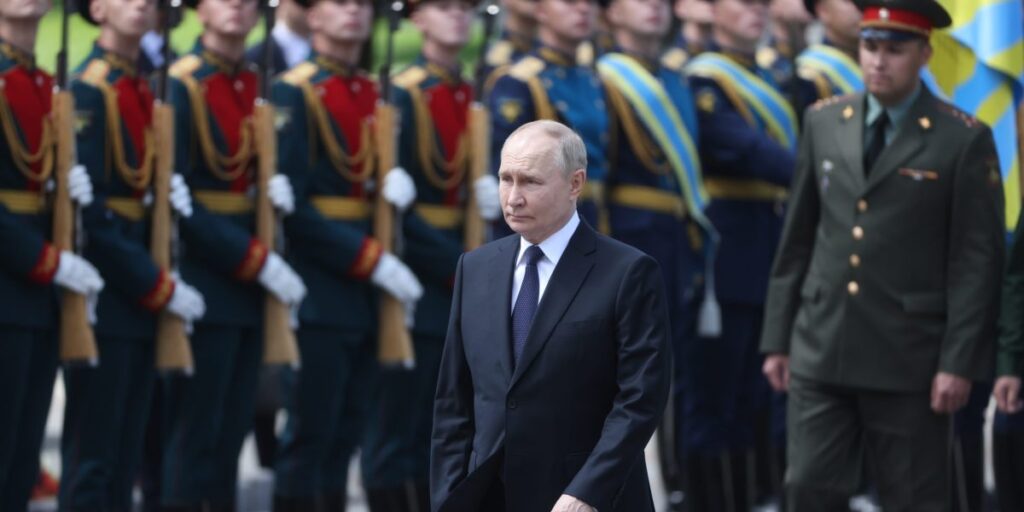
Russia sent large numbers of personnel to fight in the war in Ukraine, and crime rates in the country dropped quickly after the invasion began. Now their return is starting to spark a wave of offense.
Figures from Russia’s Supreme Court show that non-war-related crimes committed by military personnel increased by more than 20% last year. While overall numbers remain small and many returning service members have committed no crimes, there has been a significant increase in violent crime, as well as theft and drug-related crimes.
These figures do not include tens of thousands of prisoners released from prison to take part in war crimes under a plan developed by the late leader of the Wagner mercenary group, Yevgeny Prigozhin. Those who survived six months on the front line were pardoned by President Vladimir Putin and returned to Russia as free men.
In prison, “they are treated like ‘we are useless,’ and then it gets worse on the front lines,” said Kazan sociologist Iskender Yasaveev. The experience they bring is a trauma that will last for decades.”
Sociologists have long noted that crime rates tend to spike after military conflicts end, and researchers have examined a number of possible causes, from social dislocation to the trauma faced by soldiers. Russia is unlikely to reverse this trend after Putin ordered an invasion in February 2022, triggering Europe’s largest conflict since World War II. The return of prisoners who fought for Wagner provides an early sign of what might happen once the hundreds of thousands of soldiers who suffered the brutality of combat return to civilian life.
While lower-level crime has declined, the number of murders and sex crimes, particularly against children, has not fallen over the past two years. Bloomberg calculated based on Supreme Court data that indecent assaults on minors increased by 62% compared with before the war.
The return of Wagner recruits to Russia shocked residents of cities and villages, who found men they thought were serving long prison sentences living among them. People convicted of murder and even cannibalism were among those pardoned.
In June last year, Prigozhin led a failed rebellion against the leadership of the Ministry of Defense.
Kremlin spokesman Dmitry Peskov echoed widespread public unease, telling reporters in November that criminals pardoned by Putin “atone with their blood for the crimes they committed on the battlefield.”
Still, a law that came into effect in March quietly removed the right to pardon after six months of service, forcing conscripts to remain in the army until the end of the war, just like other conscripts.
Still, they come back, often deserting. Supreme Court data showed that crime cases involving the military quadrupled in 2023 compared with 2021, reaching 4,409 cases.
One deserter, Artem, said he fled after half his commandos were killed during four months in Ukraine. The unnamed 34-year-old, who was serving time in prison for drug trafficking, joined the army to escape harsh treatment. He said no one told him the service was indefinite.
The law ending amnesty also allows the Defense Department to recruit not only criminals but also people in pretrial detention. Prisoners’ rights group Russia Behind Bars estimates that as many as 175,000 former prisoners have been brought to war.
Alex Isakov, a Russian economist at Bloomberg Economics, said a postwar crime surge could cost Russia as much as 0.6% of gross domestic product . He said besides the direct loss of life and property, the state would also face higher spending on welfare and security, especially on the police.
“From the Franco-Prussian War to the Global War on Terrorism, crime rates fell early in the war and rose sharply after the war. Russia is unlikely to escape this pattern. If the conflict is resolved in 2024, then the post-war crime costs may be as low as domestic production 0.2% of gross domestic product, and if the conflict continues for another five years and some 3 million Russians face fighting, the full cost of postwar crime increases could be as high as 0.6% of GDP. ,” Isakov said.
Eager to avoid a repeat of the September 2022 call-up of 300,000 reservists, which stoked public anxiety about war, the Kremlin has instead relied on generous payments to persuade people to enlist. Contract soldiers receive a monthly salary of 204,000 rubles ($2,300), plus a signing bonus of up to 1 million rubles.
This contributed to a short-term decrease in crime rates, especially in Russian provinces. Bloomberg Economics estimates that crime records fell three times as much in areas with high enlistment numbers as in areas with moderate numbers.
Ekaterina Khodzhaeva, a sociologist and crime researcher, said: “Because the war injects huge amounts of money into the poorest areas and the poorest people, poverty-related economic crimes such as theft and robbery have increased reduced.
Russian courts handled nearly 62,000 fewer cases last year than in 2021, and the number of convictions fell by 2%. Police numbers have also fallen in many areas, a sign that fewer officers are available to solve crime problems as people abandon low-paying jobs for more lucrative military service.
Interior Minister Vladimir Kolokoltsev said in May that Russia had a shortage of 152,000 police officers across the country, with a quarter of the positions vacant in some regions.
As more criminals return from war to civilian life, this could increase the challenges authorities face in curbing crime.
“Like other veterans, they are likely to suffer from post-traumatic stress disorder,” said sociologist Anna Kuleshova of Social Vision Group. “Coupled with previous incarceration, all this combined can lead to difficulties integrating into society.”

